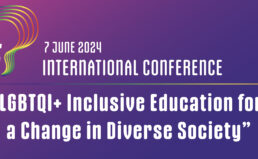LITHUANIA:
PROPOSED LAW WOULD VIOLATE STUDENTS’ AND TEACHERS’ RIGHTS AND REINFORCE HOMOPHOBIA
ACT NOW BEFORE THE FINAL VOTE ON 11 JUNE
A proposed amendment to the “Law on the Protection of Minors against the Detrimental Effect of Public Information” would, if passed, prohibit the discussion of homosexuality in schools and ban any reference to it in public information that can be viewed by children.
Article 4 of the draft law lists 19 categories of detrimental public information. Sub-section 13 prohibits “Information which agitates for homosexual, bisexual and polygamous relations”.
The proposed amendment would class homosexuality alongside issues such as the portrayal of physical or psychological violence, the display of a dead or cruelly mutilated body of a person, and information that arouses fear or horror, or encourages self-mutilation or suicide.
On 2 June 2009, the Seimas, the Lithuanian Parliament, approved the draft law at a first reading. The majority of parliamentarians were not present for the vote, but of those that were 57 voted in favour of the law, two against and eight abstained. The final vote is scheduled for Thursday 11 June.
The authors of the proposed amendment the wrote in an explanatory note that “the propagation of a non-traditional sexual orientation and exposure to information containing positive coverage of homosexual relations may therefore cause negative consequences for the physical, mental and, first and foremost, moral development of minors.”
Yet far from protecting children, the amendment, if passed, would:
· deprive students of their right to freedom of expression, including the right to seek, receive and impart information;
· institutionalize discrimination in Lithuania’s school system, which may have the effect of depriving children and adolescents of their right to education;
· risk isolating children who are already amongst the most at risk of violence at school or within the family;
· make it illegal for anybody to distribute information on or publicly portray homosexuality, through any medium to which children might have access.
In short, if the measure is enacted, Lithuania would be in violation of its obligations under international and European human rights treaties to which it is a state party. Lithuania has an obligation to act in the best interests of the child – including its lesbian, gay, bisexual or transgender children.
The proposed amendment is part of a growing climate of intimidation and discrimination in Lithuania against lesbians, gay men and bisexual and transgender people. In the past year, municipal authorities have issued derogatory statements and an EU initiative, the “For Diversity, Against Discrimination” touring truck, was banned in Vilnius and Kaunas. The Mayor of Kaunas said that “[the] homosexual festival may cause many negative emotions.”
Amnesty International calls on the Lithuanian authorities to:
· Ensure that all persons in Lithuania, including children, fully enjoy the right to freedom of expression – including the right to seek, receive and impart information.
· Prohibit any discrimination and guarantee to all persons equal and effective protection against discrimination, including discrimination based on sexual orientation or gender identity.
· Provide adequate and non-discriminatory information and support to gay, lesbian, bisexual, and transgender young people.
· Take all necessary legislative, administrative and other measures to ensure equal access to education, and equal treatment of students, staff and teachers within the education system, without discrimination on the basis of sexual orientation, engagement in consensual same-sex practices or gender identity.
· Ensure that laws and policies provide adequate protection for students, staff and teachers of different sexual orientations and gender identities against all forms of social exclusion and violence within the school environment, including bullying and harassment.
· Ensure that all sexual and reproductive health, education, prevention, care and treatment programmes and services respect the diversity of sexual orientations, consensual practices and gender identities, and are equally available to all without discrimination.
· Undertake a comprehensive programme of non-discriminatory sex education to address cultural and other taboos surrounding adolescent sexuality and gender expression and provide adolescents with access to the appropriate information, support and necessary protection to enable them to live their sexual orientation or gender identity or expression, regardless of whether their parents or guardians consent.
Background
Lithuania has an obligation under the UN Convention on the Rights of the Child to act “in the best interests of the child” (Article 3). In 2002, the UN Committee on the Rights of the Child, the body tasked with monitoring states’ implementation of the Convention, expressed concern about similar legislation in the UK, stating that “homosexual and transsexual young people do not have access to the appropriate information, support and necessary protection to enable them to live their sexual orientation.”[1] In 2003, the Committee on the Rights of the Child confirmed that the non-discrimination provision in the Convention on the Rights of the Child covers adolescents’ sexual orientation and urged states to “develop effective prevention programmes, including measures to change cultural views about adolescents’ need for contraception and STI [sexually transmitted infection] prevention, and to address cultural and other taboos surrounding adolescent sexuality”.[2]
The proposed amendment is a breach of Lithuania’s obligations under the International Covenant on Economic, Social and Cultural Rights, a core human rights treaty that includes the right to education. The UN Committee on Economic, Social and Cultural Rights, the body that monitors states’ implementation of the Covenant, recently adopted a General Comment elaborating on the non-discrimination provision of that treaty. Reiterating that sexual orientation is not a barrier to realising Covenant rights, the Committee continued “In addition, gender identity is recognized as among the prohibited grounds of discrimination; for example, persons who are transgender, transsexual or intersex often face serious human rights violations, such as harassment in schools or in the work place.”[3]
The proposed amendment also goes against the joint statement that Lithuania (together with 65 other states) signed at the UN General Assembly in December 2008, which reaffirmed that human rights apply equally to every human being regardless of sexual orientation or gender identity.[4] The states condemned “…human rights violations based on sexual orientation or gender identity wherever they occur, in particular …deprivation of economic, social and cultural rights” and stated “We are also disturbed that violence, harassment, discrimination, exclusion, stigmatization and prejudice are directed against persons in all countries in the world because of sexual orientation or gender identity, and that these practices undermine the integrity and dignity of those subjected to these abuses.”
The law, if passed, will only further such violence, harassment, discrimination, exclusion, stigmatization and prejudice.
WRITE TO:
SPEAKER OF THE SEIMAS Arūnas Valinskas Gedimino ave. 53, LT-01109 Vilnius Lithuania Fax: + 370 5 2396279 Email: Arunas.Valinskas@lrs.lt | MINISTER OF EDUCATION & SCIENCE Gintaras Steponavičius A. Volano str. 2/7, LT-01516 Vilnius Lithuania Email: Ministras@smm.lt or smmin@smm.lt |
[1] Committee on the Rights of the Child, Concluding observations: United Kingdom of Great Britain and Northern Ireland, CRC/C/15/Add.188, October 9, 2002, para.43.
[2] Committee on the Rights of the Child, General Comment No. 4: Adolescent health and development in the context of the Convention on the Rights of the Child, CRC/GC/2003/4, 1 July 2003, para.30.
[3] Committee on Economic, Social and Cultural Rights, General Comment No. 20: Non-Discrimination in Economic, Social and Cultural Rights (art. 2, para. 2), E/C.12/GC/20, 25 May 2009, para.32.
[4] Statement on human rights, sexual orientation and gender identity, A/63/635, 22 December 2008. Signed by 66 states at the UN General Assembly, 18 December 2008, joined by the USA in March 2009.



